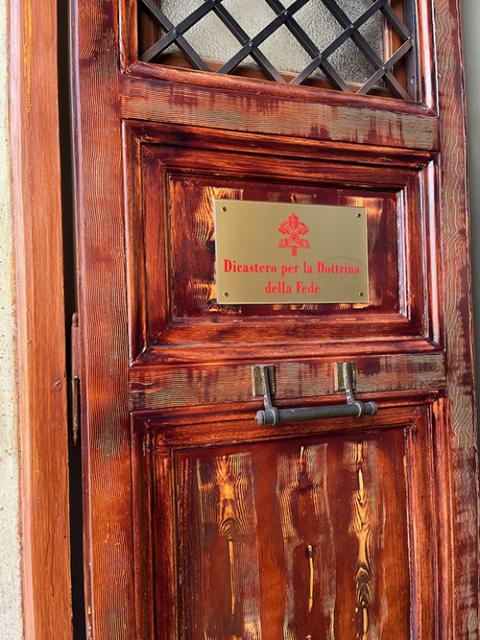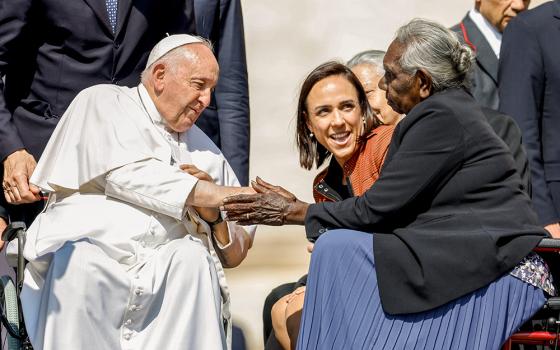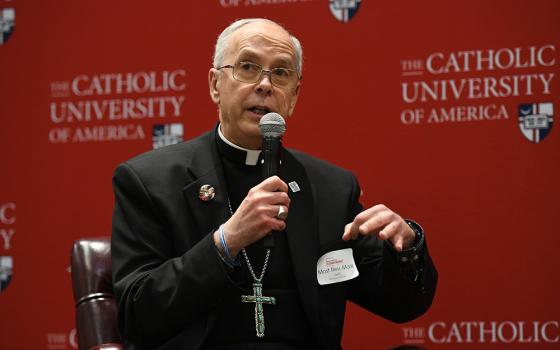Archbishop Charles Scicluna of Malta attends a news conference at the Vatican Oct. 8, 2018. (CNS/Paul Haring)
One of the Catholic Church's leading doctrinal officials has reiterated his unusual call for the global institution to consider ending its millennia-long requirement that priests remain celibate, saying that allowing priestly marriage could be a means of preventing clerics from living dangerous double lives.
In an exclusive interview with National Catholic Reporter on Jan. 24, Archbishop Charles Scicluna said: "One of my worries is that people are put in a situation where they are comfortable with a double life."
"This is not to diminish the beauty of celibacy or the heroic commitment of people who have accepted celibacy as a gift and live it," said the archbishop, speaking in an interview at the Vatican's Dicastery for the Doctrine of the Faith for NCR's "The Vatican Briefing" podcast. "But I think it is good that we discuss it."
Earlier this month, Scicluna — who serves as both the Archbishop of Malta and an adjunct secretary of the Vatican dicastery — made headlines when he said he believes it is time to revisit the church's long-standing ban on allowing marriage for most of its clerics.
At the time, the archbishop was commenting on the lives of priests who have hidden relationships, which he said could be a "symptom" of priests "having to cope with" their celibacy requirement.
Advertisement
But in the NCR interview, Scicluna, who has also been tapped by Pope Francis to investigate claims of clergy abuse in places across the world, said that — not drawing any link between priestly celibacy and clerical abuse — this work has shaped his perspective.
"You realize when you travel a lot and you meet other people, that people find themselves in different states of life," he said. "And this could be, could be — I'm not saying that this is an actual magic wand sort of thing — could be also something … worth discussing," he said.
A proposal to greenlight the ordination of married priests in the nine-nation Amazon region of Latin America was one of the most intensely debated issues at the Vatican's 2019 synod on the Amazon. Although the proposal received the necessary two-thirds majority vote for approval of the synod members at the end of the assembly, Francis has so far declined to move on the request.
A similar proposal was included in the final synthesis document of the 2023 October synod on synodality, in which Scicluna participated, and further discussion on the topic is expected when the synod reconvenes for a second session in October 2024.
"What you learn through experience is that you have to factor in human frailty, and the fact that people mature into different situations; they find themselves in a different place psychologically, spiritually," said Scicluna. "This is something that … the church at the highest authority will have to decide."
Scicluna's remarks on "The Vatican Briefing" came in an interview timed to coincide with the five-year anniversary of Francis' historic 2019 summit on clergy sex abuse, when the pope summoned the heads of the world's Catholic bishops' conferences to Rome to discuss the protection of minors.
One of the major outcomes of that meeting was the promulgation of a sweeping new church law, Vos Estis Lux Mundi ("You are the light of the world"), mandating for the first time that all priests and members of religious orders worldwide are obligated to report any suspicions of abuse or its cover-up.
While the law was initially adopted on an experimental basis, in March 2023, the pope made the law permanent and extended it to also apply to lay leaders who head international Catholic associations recognized by the Vatican.
Reflecting on its significance, Scicluna said the law is notable for providing a "special procedure that ensures and guarantees accountability, but also responsibility" for "how to investigate people in leadership."
However, the archbishop also acknowledged that there are "pockets" within the church where the law is not fully implemented, and that more work remains.
"I think that the fact that we have the law is not like we've done our duty and this is like a job well done," he said. "We have a law which is an instrument, whether we use it or not will depend on people in leadership, but also on the communities."

The door into the Vatican's Dicastery for the Doctrine of the Faith, seen on Jan. 24 (NCR photo/Joshua J. McElwee)
Beyond mandating abuse reporting, Vos Estis also set up a new global system for the evaluation of reports of abuse or cover-up by Catholic bishops. It empowered archbishops to conduct investigations of prelates in their local regions, with the help of Vatican authorities.
Asked about criticism from abuse survivors and their advocates that the investigation system is effectively a form of self-policing, Scicliuna countered that "there are levels of accountability that are not only … in-house."
In particular, he highlighted the fact that Vos Estis mandates that church authorities give cooperation to civil authorities.
"I think that the guarantee is always the disclosure not only to the church, but the statutory authorities, where the case allows for that and warrants that," said Scicluna.
The archbishop also emphasized that beyond the new reporting obligations, another element of the law is that church leaders now have a specified "duty of care" for victims of abuse.
In a January 2023 interview with the National Catholic Reporter, Scicluna had previously called on the church to improve its treatment of abuse victims, especially with regard to following up when they file reports of abuse or cover-up.
During the new Jan. 24 interview, the archbishop repeated that need, saying: "We need to connect with victims in all phases of the process."
"I think that if the church is not accountable, it's not synodal."
— Archbishop Charles Scicluna
"The victim has a right to report misconduct, they have a right to give their testimony and to offer their contribution to an investigation, but then they need to be accompanied and to be informed of the outcome of the case," he continued. "Because that not only respects their dignity, but gives them peace of mind."
Scicluna also commented on how the concept of accountability fits together with Francis' vision for a synodal church, in which all Catholics are involved in leading together.
"I don't think that there is any option away from accountability," said the archbishop.
"I think that if the church is not accountable, it's not synodal," he continued. "I don't think that a synodal church would be truly synodal — that is, walking together — if we're not caring for each other and we're not accountable to each other."
How do I listen?
From your computer:
Click the "play" button inside this article to start the show. Make sure to keep the window open on your browser if you're doing other things, or the audio will stop.
From your mobile device:
You can listen and subscribe to "The Vatican Briefing" from any podcast app. If you're reading this from an iPhone or other Apple mobile device, tap this link to listen in Apple Podcasts. The podcast is also available on Spotify, at this link.
If you prefer another podcast app, you can find "The Vatican Briefing" there. (Here's the RSS feed.)








